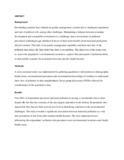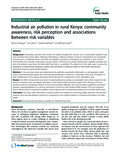| dc.contributor.author | Omanga, Eunice | |
| dc.contributor.author | Lisa, Ulmer | |
| dc.contributor.author | Zekarias, Berhane | |
| dc.contributor.author | Gatari, Michael | |
| dc.date.accessioned | 2014-07-07T07:04:22Z | |
| dc.date.available | 2014-07-07T07:04:22Z | |
| dc.date.issued | 2014 | |
| dc.identifier.citation | BMC Public Health 2014, 14:377 | en_US |
| dc.identifier.uri | http://www.biomedcentral.com/1471-2458/14/377 | |
| dc.identifier.uri | http://hdl.handle.net/11295/72134 | |
| dc.description | Article | en_US |
| dc.description.abstract | Background
Developing countries have limited air quality management systems due to inadequate legislation and lack of political will, among other challenges. Maintaining a balance between economic development and sustainable environment is a challenge, hence investments in pollution prevention technologies get sidelined in favor of short-term benefits from increased production and job creation. This lack of air quality management capability translates into lack of air pollution data, hence the false belief that there is no problem. The objectives of the study were to: assess the population’s environmental awareness, explore their perception of pollution threat to their health; examine the association between specific health hazards.
Methods
A cross-sectional study was implemented by gathering quantitative information on demographic, health status, environmental perception and environmental knowledge of residents to understand their view of pollution in their neighborhood. Focus group discussions (FGDs) allowed for corroboration of the quantitative data.
Results
Over 80% of respondents perceived industrial pollution as posing a considerable risk to them despite the fact that the economy of the area largely depended on the factory. Respondents also argued that they had not been actively involved in identifying solutions to the environmental challenges. The study revealed a significant association between industrial pollution as a risk and, perception of risk from other familiar health hazards. The most important factors influencing the respondents’ pollution risk perception were environmental awareness and family health status.
Conclusion
This study avails information to policy makers and researchers concerning public awareness and attitudes towards environmental pollution pertinent to development and implementation of environmental policies for public health. | en_US |
| dc.language.iso | en | en_US |
| dc.publisher | University of Nairobi, | en_US |
| dc.title | Industrial air pollution in rural Kenya: community awareness, risk perception and associations between risk variables | en_US |
| dc.type | Article | en_US |
| dc.type.material | en_US | en_US |


